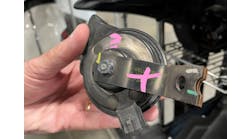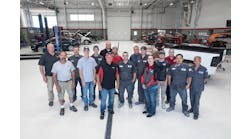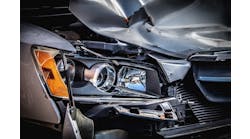A recently introduced piece of legislation that would amend U.S. design patent law to reduce the time OEMs can enforce design patents on collision repair parts against alternative parts suppliers has caused numerous industry associations and stakeholders to voice support—or opposition.
The Save Money on Auto Repair Transportation (SMART) Act, proposed by Congressman Darrell Issa (CA-50), amends title 35, United States Code, to provide for an exception from infringement for certain component parts of motor vehicles.
“Purchasing an automobile is one of the most significant investments anyone makes. But according to AAA, one in three American drivers are unable to cover the costs of an unexpected car repair bill without going into debt,” said Issa. “With the average sticker price of a new car now exceeding $30,000 and repair costs continuing to rise, consumers deserve access to as many auto repair part options as possible. The SMART Act increases consumer choice, encourages competition, fosters innovation and will ultimately drive down the cost of expensive repairs.”
The Society of Collision Repair Specialists (SCRS) established its objection to the Save Money on Auto Repair Transportation (SMART) Act.
“The small businesses we represent want to perform safe and proper repairs that allow us to place our customers and their families back into a repaired vehicle with confidence that it will continue to provide the safety they expected from it, prior to their collision,” read the SCRS statement. “Parts selection is a critical part of a safe and proper repair, and collision repair businesses have simply learned through first-hand experience that reverse engineered imitation parts are not the same as parts made and distributed by the OEM.”
The SMART Act is supported by: Consumers for Auto Reliability and Safety Coalition, National Association of Mutual Insurance Companies (NAMIC), CARE, Retiresafe, CFA, American Property Casualty Insurance Association (APCIA), Automotive Body Parts Association (ABPA), Autocare, LKQ, Autozone, and Auto Care Association, CAPA and the CAR Coalition.
“The SMART ACT is a win for consumers,” said Clark Plucinski, CAPA Chairman. “The misuse of design patents on parts used for collision repairs to block competition was highlighted by the Federal Trade Commission (FTC) in its recent report to Congress, and this important legislation addresses that issue. It’s just not fair for consumers to be forced to pay monopolistic prices for the parts needed to repair their vehicles.”
SCRS noted that proponents represent aftermarket part suppliers, aftermarket retailers, and automobile insurers.
“There are no universal standards in the replacement industry that all parts must meet,” added SCRS executive director, Aaron Schulenburg. “Working day in and day out on collision repairs, the shops we represent have firsthand knowledge of the wide spectrum of part quality found in the marketplace. Conducting a repair with all OEM parts makes the repairs go faster. Often, imitation parts—while cheaper on paper—fail to fit, costing additional time and labor to either manipulate the part or wait to receive a better-quality solution. When parts are so ill-fitting that shops are forced to return the product and wait for a replacement, it negates the perceived benefit of using a cheaper part, not to mention raises concerns over whether those parts would have restored the safety and value of the consumer’s vehicle.”
The SMART Act establishes that “it shall not be an act of infringement of the design patent to make or offer to sell within the United States, or import into the United States, any article of manufacture that is similar or the same in appearance to the component part that is claimed in the design patent if the purpose of the article of manufacture is for the repair of a motor vehicle so as to restore the motor vehicle to the appearance of the motor vehicle as originally manufactured.”
Under the SMART Act, aftermarket parts suppliers and manufacturers can design and ultimately sell an imitation collision repair part after just 2.5 years have elapsed from the date of an automaker patent – rather than the existing 14-year period. It would essentially mean that the imitation parts market is above existing U.S. patent law, and SCRS stands in opposition of the proposed language and in support of consumer safety.




